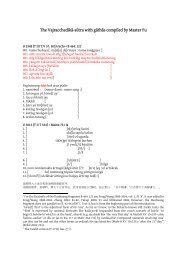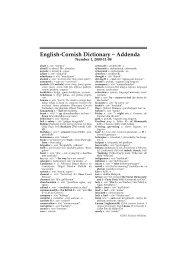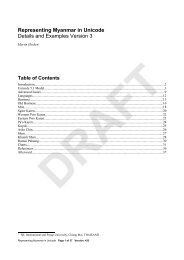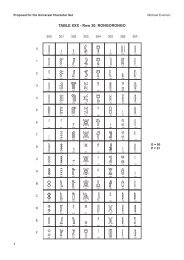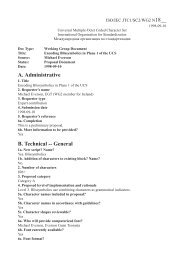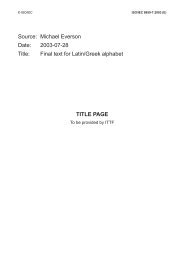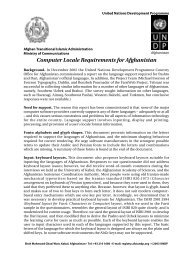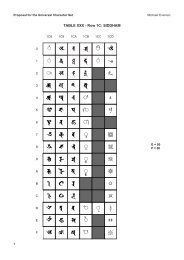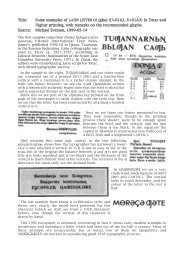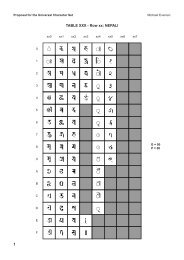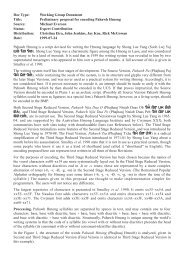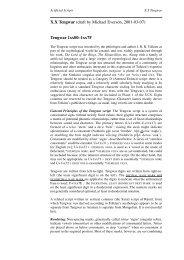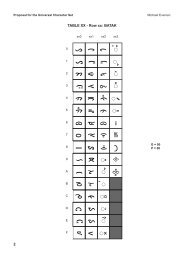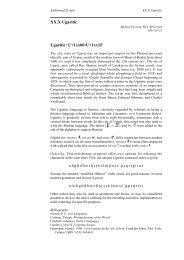open letter to the Irish Minister for Finance - Evertype
open letter to the Irish Minister for Finance - Evertype
open letter to the Irish Minister for Finance - Evertype
You also want an ePaper? Increase the reach of your titles
YUMPU automatically turns print PDFs into web optimized ePapers that Google loves.
“cents”) used <strong>the</strong> plural “cent” with me when handing me back my change. When I queried her on this, she<br />
said, “Well, <strong>the</strong>y changed it, you know.”<br />
They?<br />
Yesterday in an off-licence in Camden Street I saw a notice that “15 cent” was <strong>to</strong> be charged on plastic bags,<br />
and I asked <strong>the</strong> shop proprie<strong>to</strong>r about it. He said that he used that spelling because although he himself<br />
prefers <strong>to</strong> say “15 cents”, he felt that he was obliged <strong>to</strong> write it without <strong>the</strong> -s because that was “official”.<br />
Exactly what well-in<strong>for</strong>med linguistic authority is it that imposed such a change <strong>to</strong> our language on him?<br />
The Council of Europe?<br />
And <strong>to</strong>day when I spoke <strong>to</strong> a woman serving me coffee about this matter, I <strong>to</strong>ld her that <strong>the</strong> Commission’s<br />
Translation Service recommended <strong>the</strong> natural plural. A huge smile broke on<strong>to</strong> her face and she said “You<br />
mean we have permission <strong>to</strong> say ‘euros’? It’s really hard <strong>to</strong> remember <strong>to</strong> say ‘three euro’.”<br />
Must we have permission <strong>to</strong> speak English naturally?<br />
On <strong>the</strong> streets throughout <strong>the</strong> country, a great many people are saying “euros”. But one also finds that many<br />
merchants are saying “euro”, or are trying <strong>to</strong> avoid <strong>the</strong> issue by omitting <strong>the</strong> currency name al<strong>to</strong>ge<strong>the</strong>r. This<br />
is where Ireland has per<strong>for</strong>med badly in <strong>the</strong> changeover. People feel uncertain and uncom<strong>for</strong>table. It’s<br />
natural <strong>to</strong> say “euros and cents” but <strong>the</strong> media continue <strong>to</strong> impress upon us that we’re “supposed” <strong>to</strong> say<br />
“euro and cent”. We, <strong>the</strong> <strong>Irish</strong> people, should not be made <strong>to</strong> feel uncom<strong>for</strong>table about any aspect of our new<br />
currency – least of all how <strong>to</strong> say it naturally.<br />
It is my belief that <strong>the</strong> <strong>Irish</strong> Government misunders<strong>to</strong>od <strong>the</strong> intent of Council Regulation (EC) No. 1103/97<br />
and that we are suffering from that misunderstanding now. Some people have even suggested that “cent”<br />
could be <strong>the</strong> plural <strong>for</strong> <strong>the</strong> euro subdivision, while “cents” could be retained <strong>for</strong> <strong>the</strong> US, Canadian,<br />
Australian, Hong Kong and o<strong>the</strong>r currencies – but this is both objectionable in principle and impossible in<br />
practice. I have seen more than one RTÉ presenter read off <strong>the</strong> exchange rates between <strong>the</strong> euro and <strong>the</strong><br />
dollar, saying, in obvious error, “one dollar and fifteen cent”. This is in<strong>to</strong>lerable – it makes us all look ra<strong>the</strong>r<br />
ridiculous. The media in <strong>the</strong> US quite happily use <strong>the</strong> natural plurals “euros” and “cents” in all contexts and<br />
<strong>the</strong> Washing<strong>to</strong>n Post has ridiculed <strong>the</strong> “legislative” plural – doubtless not <strong>the</strong> only newspaper <strong>to</strong> do so.<br />
It is important <strong>to</strong> note that in France, Portugal, and Spain, <strong>the</strong> official <strong>for</strong>ms are pluralized naturally: euros<br />
and centimes, cêntimos, and céntimos respectively. In Catalunya, <strong>the</strong> Institut d’Estudis Catalans published an<br />
official recommendation in January 1998 that euros and cents (or cèntims) be used. 2 Why may we not write<br />
and say euros and cents in English? There is no reason. The Greeks are “allowed” <strong>to</strong> engrave, instead of<br />
cent, <strong>the</strong>ir own word on <strong>the</strong>ir coins – (§∂∆√, and plural §∂∆∞, appear on Greek coins while CENT<br />
appears on <strong>the</strong> o<strong>the</strong>r national coins) and <strong>the</strong> Finns are “permitted” <strong>to</strong> write <strong>the</strong> nominative plural eurot, <strong>the</strong><br />
partitive singular euroa (after numbers) as well as <strong>the</strong> nominative singular sentti, nominative plural sentit,<br />
and partitive singular sentiä (after numbers). A Commission document giving <strong>the</strong> <strong>for</strong>ms that are <strong>to</strong> be used<br />
in Community legislation is attached. 3 Note that <strong>the</strong> author of this document has added a footnote<br />
apologizing <strong>for</strong>, but hardly defending, <strong>the</strong> bad grammar: “This spelling without an ‘s’ may be seen as<br />
departing from usual English practice <strong>for</strong> currencies.” There is no attempt <strong>to</strong> explain why <strong>the</strong> English plural<br />
should be anomalous while <strong>the</strong> French, Portuguese, and Spanish all have plurals in -s. The error is that<br />
Ireland did not seek <strong>to</strong> defend natural grammar in 1998 when o<strong>the</strong>r countries did.<br />
In fact, <strong>the</strong>re is no real reason <strong>to</strong> use pluralless <strong>for</strong>ms even in legislation in English – but, in my opinion,<br />
what’s written in <strong>the</strong> legislation isn’t that important, even if <strong>the</strong> grammar is incorrect. What is important is<br />
that we care about what newsreaders and advertisers broadcast in<strong>to</strong> our homes on television and radio, and<br />
about what <strong>Irish</strong> shoppers and shopkeepers say <strong>to</strong> each o<strong>the</strong>r when we use our new currency.<br />
2http://www.iec.es/institucio/seccions/Filologica/llenguacatalana/documentsnormatius/euro.htm<br />
3 From http://europa.eu.int/euro/ html/dossiers/00219/00219-en.pdf



